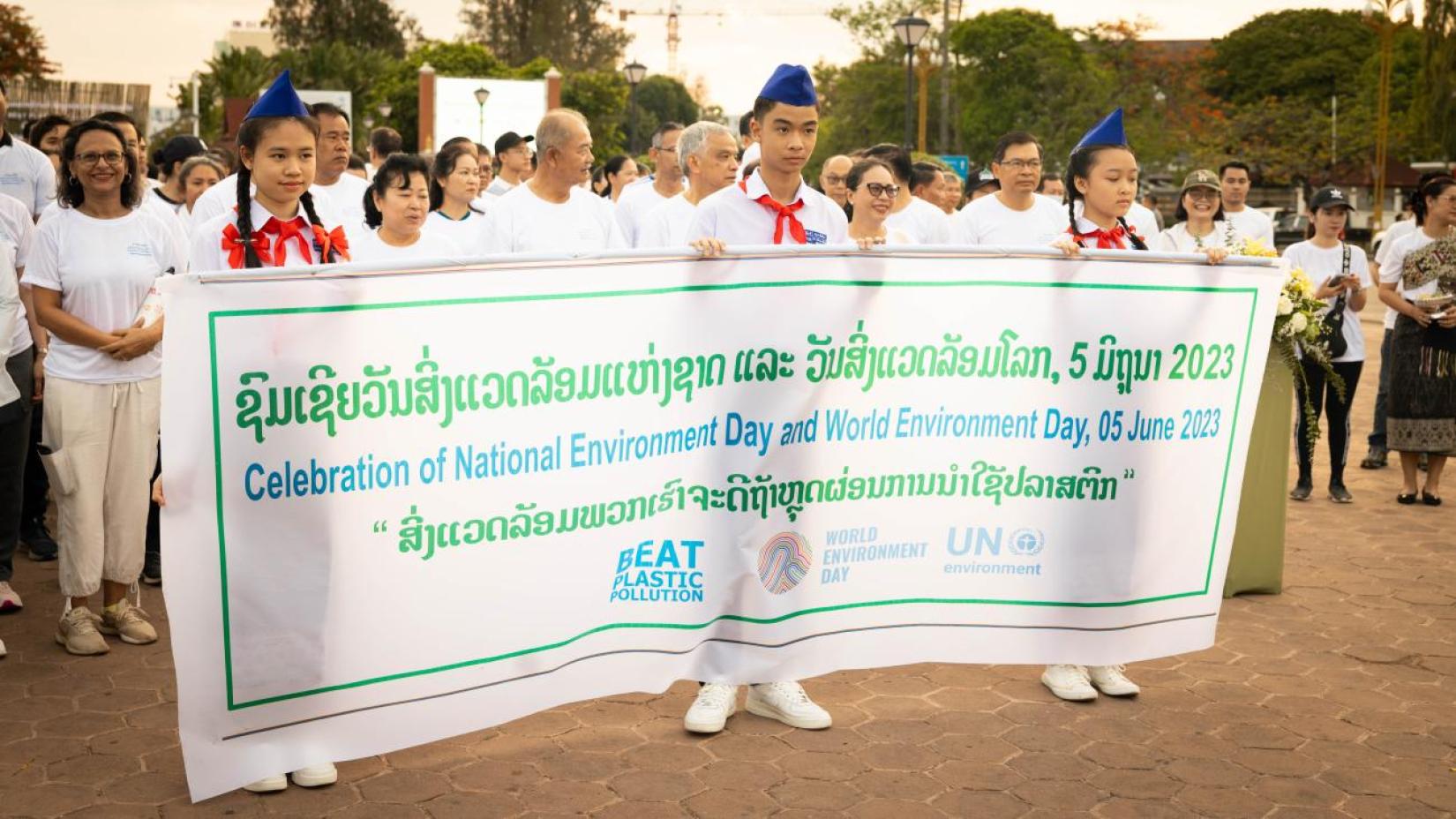Remarks on World Environment Day 2023
World Environment Day 2023
3rd June 2023
Patuxay Monument, Vientiane, Lao PDR
Opening Remarks

UN Designated Official a.i.,
Ms. Mariam Khan, UNFPA Representative, Lao PDR
[Opening Remarks]
Your Excellency Prime Minister Sonexay Siphandon,
Your Excellency Deputy Prime Minister Professor Kikeo Khaykhamphithoune, Your Excellency, Minister of Natural Resources and Environment, Bounkham Vorachit,
Dr Atsaphangthong Siphandone, Mayor of Vientiane Capital,
Honourable guests,
Ladies and Gentlemen, stewards of our shared environment,
On behalf of the United Nations in Lao PDR, I congratulate you for organising this event and thank you for inviting the United Nations to join the celebration of 50th anniversary of the World Environment Day.
The United Nations, including FAO, UNDP, UNICEF, WHO, and the Office of the Resident Coordinator, are delighted to support this event – and many have joined me here today.
I also congratulate the Ministry of Natural Resources and Environment for all the efforts, including planting trees and promoting use of recyclable cotton bags.
Together we can “walk the talk” of the theme for World Environment Day: “Solutions to Plastic Pollution”.
Plastic pollution is a global issue:
Globally, one million plastic bottles are purchased every minute, while up to five trillion plastic bags are used worldwide every year.
This equates to about 400 million tonnes of plastic waste per year:
Only 10% is recycled; 90% is dumped or burned. Microplastics then are found in food, in water in air. Daily over 2,000 garbage trucks of plastic is dumped into oceans, rivers, and lakes. It is estimated that there will be more plastic than fish in the ocean by 2050, if nothing is done.
This planet is our only home. Yet we currently are failing to protect it.
We hear of Triple Planetary Crisis of climate change, biodiversity loss, and pollution:
Greenhouse gas emissions continue to rise, causing extreme weather; More than one species in five is now threatened with extinction; Pollution causes some 9 million premature deaths each year.
Lao PDR hosts internationally significant natural assets, including its rich biodiversity and renewable energy sources. But the Triple Planetary Crisis knows no borders, and Lao PDR is impacted. Climate change affects every nation: temperatures in Lao PDR are projected to rise by 2 to 3 °C by 2050, with increasingly unpredictable weather patterns. Annual floods, and this year’s heatwave and delayed rains are sad examples of what may become increasingly common. Biodiversity loss – threatening global agricultural production due to pollinator decline – will worsen food insecurity in all countries. We saw worsening Air pollution in Lao PDR, Water pollution poses risks to the Mekong. Imports of plastic to Lao PDR increased over 78 times. In Vientiane, 650 tonnes of waste is generated daily , 24% is plastic.
Ladies and gentlemen, with lack of action, people and planet both suffer. Marginalised and already vulnerable groups and those with disabilities are disproportionately affected by climate change and environmental degradation, worsening their existing challenges.
Traditional gender roles mean women and girls are disproportionately affected, threatening their rights to seeking sexual reproductive health, benefitting from safe motherhood and retention in schools. healthy environment is the basis for food, clean water, medicine, and for achieving all Sustainable Development Goals. So, let us talk of the solutions which are in our hands shown through everyday actions. Government policy towards renewable energy, circular economy, and by protecting ecosystems – Lao’s forests and rivers; Businesses can put sustainability at the heart of their decision-making; Youth, women and girls can be forceful agents of change. They must be empowered and included in decision-making at all levels.
Schools, can educate and empower youth on the risks and possible responses to environmental challenges; We consumers can make sustainable choices and reduce waste. By acting now to reuse, recycle, reorient, and diversify away from plastics, we can reduce plastic pollution by 80 per cent by 2040.
Your presence here shows us – your Government, the United Nations, and all present today – that you are deeply committed to protecting the environment. You are urging us all to do more and to act faster. UN in Lao PDR supports Laos to fight against plastic pollution, and we will continue to work for Lao PDR to set and achieve ambitious targets for the global UN Treaty on Plastic pollution.
We each have a role to play, and a contribution to make to the global effort to preserve our common planet, upon which all our other aspirations depend. I ask you to avoid plastic bags, use cotton/recyclable bags (like the ones today); avoid plastic packaging, and use natural banana leaves. We brought our reusable bottles/mugs/straws. We can Beat Plastic Pollution.
Thank you.










